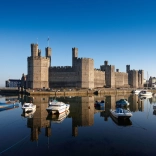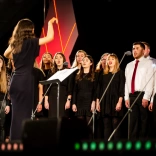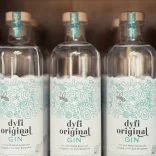Wales’ relationship with the silver screen dates way back to 1898, when pioneering Welsh filmmaker Arthur Cheetham showcased his film of children playing on a beach to a jam-packed Rhyl Town Hall. Despite having a run time of just a few minutes and no sound, it left audiences amazed.
Today, Welsh films – typically longer and with slightly more colourful plotlines – continue to wow moviegoers. Outfits such as Film Hub Wales, and its Creative Wales-funded Made in Wales project, are working to ensure Welsh filmmakers have a platform to share their work. This is great news for cinephiles and also for Wales as a whole, with film playing an important role in shaping how the country is perceived by the wider world.
Must-see Welsh movies
To give a small taste of the rich tapestry of stories coming out of Wales, Radha Patel, Made In Wales Officer for Film Hub Wales, has selected seven films that offer a rounded introduction to Welsh cinema for newbies. The selections – some old, some new – give an idea of the topics and genres that resonate with Welsh filmmakers, and provide a window into our culture, humour and values.
1. Gwledd (The Feast) (2021)
Overview: Wales boasts a back catalogue of great horror flicks (an association perhaps stemming from the country serving as the setting of the classic 1941 film The Wolf Man), and Gwledd is one of the more recent entries to terrify audiences.
Debuting at the American South by Southwest festival in 2021, the film revolves around a dinner party where a wealthy family hopes to broker a deal to sell off areas of rural land to a fracking company. However, the presence of a mysterious waitress, hired for the event, causes the plans to unravel in the most gruesome of fashions. Described as an eco-horror, this twisted fable is written in Welsh and set against the dramatic scenery of Mid Wales.
Why you should watch it: “I love this film because, in a similar style to popular horror movies like Get Out and The People Under the Stairs, and even the Welsh film Censor, there is a pressing social consciousness to it. It has a strong message about the displacement of Welsh communities and spiritual connections to land, which chimes strongly with very real challenges facing modern Wales today – namely, those around second-home ownership, loss of community and gentrification.”
Where to watch: Amazon Prime; Apple TV; YouTube Premium
2. The Toll (2021)
Overview: Ever wondered what a Welsh western would look like? Set in the ‘Wild West of Wales’, aka Pembrokeshire, The Toll is a dark comedy about a man operating Wales’ quietest toll booth. When the mysterious man’s grisly past begins catching up with him, however, chaos unfolds in this sleepy Welsh town.
While there are no horses or ten-gallon hats, there is a brooding protagonist and a gun battle or two, with the expansive coastal scenery of West Wales serving as a fitting alternative to the tumbleweed-trundling desert vistas of Arizona and New Mexico.
Why you should watch it: “The Toll is a really great film for so many reasons. It has a very cool cinematic feel that is indicative of a new wave of Welsh movies, with their own distinctive style. It’s also funny as hell. There’s a cast of eccentric characters that definitely aren’t Welsh stereotypes, but are well rounded and have familiarity to them. This was a film made with a Welsh audience in mind.”
Where to watch: Amazon Prime
3. Y Chwarelwr (The Quarrymen) (1935)
Overview: The Quarrymen was the first Welsh-language talkie. Fittingly, it focuses on a topic that has played a significant role in shaping Welsh history and identity: the mining industry.
The fictional film, set in Blaenau Ffestiniog (and starring members of Blaenau Ffestiniog’s amateur dramatics group), provides a sincere insight into the daily lives of those working in the slate mines of North Wales, highlighting the dangers of the work, but also the camaraderie present in these close-knit communities. Much of the film was shot on-site at the then-still-functioning Llechwedd Quarry, which is today a visitor attraction offering pit tours.
Why you should watch it: “What I like most about the film is its tone. It doesn’t romanticise what life would have been like for miners during this period – after all, these men literally gave up their daylight in order to make enough money to live. Equally, it doesn’t fetishise their struggle, but emphasises how, even though life was hard, community and having each other’s backs is what kept them going.”
Where to watch: BFI Player (UK only)
4. I Am Not a Witch (2017)
Overview: A mystical drama film set in Zambia, I Am Not a Witch was selected as the UK’s entry for the Best Foreign Language Film at the 91st Academy Awards. It also earned Zambian-Welsh director Rungano Nyoni a BAFTA for Outstanding Debut in 2018.
The film focuses on the life of Shula, a young girl who is convicted of being a witch, and the strange consequences this proclamation has on her life, ranging from TV chat show appearances to the ever-present fear of being turned into a goat.
Why you should watch it: 'A film doesn’t have to be set in Wales to be considered a Welsh film, and I Am Not a Witch is a perfect example of this. It’s a masterclass in storytelling from a Welsh filmmaker. I remember when it showed at Cannes [film festival] it received a standing ovation. I hope we can celebrate Rungano Nyoni’s next film in the same way.'
Where to watch: Amazon Prime; Netflix; Apple TV
5. Donna (2022)
Overview: Welsh filmmaker Jay Bedwani swapped the streets of the Welsh capital for the buzzing boulevards of San Francisco to produce his debut feature, Donna. The documentary follows the life of Donna Personna, a celebrated trans activist and legend of the local drag circuit, as she takes on the task of writing a play about the 1966 Compton's Cafeteria riot – one of the first LGBT-related riots in US history – while also attempting to reconnect with her highly religious, estranged family.
Originally created as a 10-minute short, My Mother, which won the Iris Prize for Best UK Short at Europe's largest LGBT film festival, the film is a story about the importance of community, activism, and being your authentic self.
Why you should watch it: “For the first time in Welsh cinema history, Wales is releasing two trans-led stories within a year (the other is Being Hijra). Donna is an intimate and uplifting film, beautifully observed by debut director Jay Bedwani, and comes at a really pivotal moment for trans people, especially young trans people in Wales. It’s also a testament to the diversity of films currently coming out of Wales.”
Where to watch: Google Play; YouTube Premium
6. Dark Horse (2015)
Overview: Before the feel-good family film Dream Horse stormed the box office, there was the documentary Dark Horse, offering a more authentic take on the true story of a group of locals from a small Welsh town who banded together to buy and train a champion race horse.
Winner of the World Cinema Documentary Audience Award at the Sundance Film Festival, it features interviews with the people at the heart of this remarkable turn of events. The film offers an honest insight into the highs, lows, and challenges of the journey that is perhaps absent from the glossier, blockbuster version of the story.
Why you should watch it: 'For me, this documentary film is very summative of the Welsh experience. We, as Welsh people, have all this self-determination, and communities that support one another. But I feel like the rest of the world, personified here by the hired upper-middle-class trainer, don’t have faith in us to really achieve. This film is about overcoming that stigma. Because, while it all sounds a bit happy-go-lucky out of context, the locals in Cefn Fforest didn’t take on this horse on a whim, or as a joke. They were determined it would win, and it did win. And I love that. It’s a fantastic watch.'
Where to watch: Apple TV
7. Very Annie Mary (2001)
Overview: Long before she directed the big-budget 2022 hit Save the Cinema (another Welsh film), Sara Sugarman gave the world Very Annie Mary, an intimate coming-of-age story.
The musical comedy film centres on titular character Annie Mary, a promising singer who believes she can become a star, but struggles to untangle herself from the binds tying her to her hometown. The Welsh town of Bridgend serves as the fictional village of Ogw, where the film is set.
Why you should watch it: 'I remember The New York Times quipped that this film is "almost choking on its own cuteness". I think this shows the need for more Welsh film critics to review Welsh films. I think generally critics want Welsh films to be gritty and dark, but here, while there is hardship, there’s also so much joy. There’s a lovely message about overcoming the limitations people have, whether that’s career-wise, or the limits placed on them by their families. I think that’s what makes it really special – and definitely not "cute".'
Where to watch: Available to purchase on DVD
Looking for more recommendations? Other great Welsh films chosen by Radha include:
A Way of Life
Anorac
Eternal Beauty
Sleep Furiously
Censor



